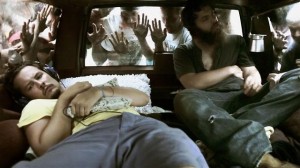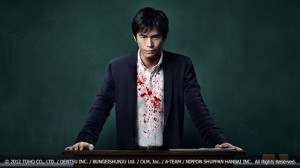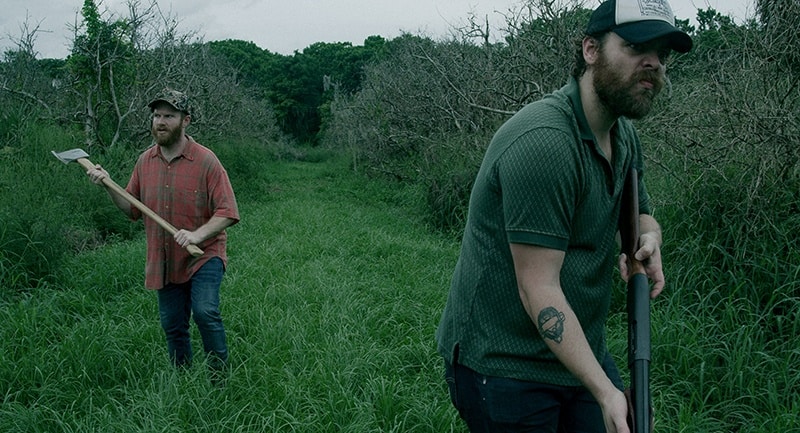
Fantasia 2013: An Open Wound (opening weekend part 2, The Battery and Lessons of the Evil)
The lights went dim, and there I was, formally in a movie theatre filled with sweaty humanoids, but now I’m alone, floating in the sweaty abyss. What’s that noise? Is anyone there? Are you still with me? I don`t want to put that in my mouth, stay back, no….no…. NOOO!!!!!!! This is a transcript of a nightmare I just had following a three film screening on a humid Montreal Sunday night. Fantasia fest is in full swing around these parts and anyone who has been reading me in the past knows what that means: sore asses and missed opportunities.
Here’s part two of what I checked out on opening weekend:
The Battery
(Canada, 2013, Quebec premiere)
There is something about the zombie subgenre that just won’t die. Like a shambler, walking aimlessly through a desolate neighborhood, a new zombie film appears just as often as we collectively say: we`ve had enough. However, much like the undead, the staying power of such films is as tenacious as the zombies themselves. These movies get under our collective skins because they corrupt the very thing that makes us distinguishable from “them”: our conscience.
So once again, the zombie apocalypse has struck hard, leaving Mickey and Ben, former baseball buddies, to roam the land in search of food and shelter. Stay moving and you live, stay put and you die. That seems to be the lesson Ben is trying to teach his friend, but Mickey hasn`t yet accepted his fate and refuses to face the problem head on. Listening to music, chilling out, daydreaming, that`s the life for Mickey, preferring to leave the hard and heavy stuff for Ben to deal with. Life often catches up with you though, doesn`t it? Playing ostrich will only get you so far and Mickey is slowly forced to get out of his shell. Sometimes however, it’s important to keep it real and to know your limits: Mickey is soon going to find that out.
Directed by Jeremy Gardner, it’s the film’s clever interplay between denial and zeal that allows this micro budget (it was shot for an alleged $6000.00!) shocker to really get under your skin. The moments shared between characters are tender and touching considering the circumstances. Zombie attacks are rare and frankly, detract from the actual story of interest. This type of “people centric” focus on the zombie genre is nothing new. Night of the Living Dead was scary and effective very much for this reason. It seemed however that the genre slipped away from this perspective, preferring to focus on violence and dread. Violence in the Battery is rarely shot onscreen and the filmmakers are smart enough to use their budget to their advantage: talking heads. Several scenes take place in the same confined environment, as if saying “who cares what else is out there, this is what counts”. They barely even touch upon the philosophical “why” of their situation, preferring to focus on the present: how will they get by, where will they find shelter, and so on. Frankly, without spoiling too much, I find that it’s their eventual curiosity of the future that gets them into trouble. As long as you can get by day by day, what more do you need. (You gotta keep your eyes on the prize baby, but that doesn`t mean you have to lose sight of what you got).
The Battery is essential indie viewing for those who think the Miramax spirit of yesteryear is dried up and finished. Characters exchange witty banter as the world crumbles around them and you end up caring more about their stupid quibbles than the undead at their doorstep. I completely forgot this was a horror movie within the first ten minutes, and I love that about this film.
Lessons of the Evil
(Japan, 2012, Canadian Premiere)
By now, you`ve all probably heard that Takashi Miike`s supposed return to his splattery roots is more or less smoke and mirrors. Lessons of the Evil is a straight up slasher, where the body count involves mainly high school students, culminating in an epic showdown that will leave your mouth agape, not from shock, but at how sedated the whole experience felt despite a convincing performance from Hideaki Ito.
Mr. Hasumi (Ito) is a rock star teacher who is both well respected by his peers and loved by his students at Shinko Academy. Always available to lend a helping hand, he always seems to know what to do or to say to come to the aid of his kids and fellow peers. Big surprise, all is not what it appears to be and people start turning up dead (as always). Turns out, Mr. Hasumi is a psychopath serial killer and Shinko Academy is his venue of choice to act out his violent impulses. In pure Miike fashion, the onscreen violence is visceral and nasty shot, despite the fact that you rarely see any of the red stuff onscreen. No sensationalism, no over the top arterial sprays, just straight up real world violence.
Naturally, Hasumi’s actions start to catch up with him and the requisite game of cat and mouse takes place. As taboo as the portrayal of violence in school has become, there is something to be said about the young victims who die at the hands of the person they trust the most. Call it naiveté, call it hormones, chalk it up to cultural differences if you must, but the blind trust that these kids had in their mentor left me with that general sense of grief.
In the press materials I browsed, the film is sold as being shocking and controversial; but frankly, aside from the subject matter itself, there is little empathy to latch on to emotionally speaking. I just didn`t care enough to be “shocked” as you never really get to know any of the characters before they are killed-off. By the end, each scene essentially plays out like the last one, as you go from one kill to the next. Yes, the killer is depraved. Yes, he has a long history of committing similar acts. Yes he`s a monster. But I just didn`t care. Maybe that was the point: by avoiding empathy, we share common traits with the titular psychopath.
It could have simply been an issue of scale that prohibited the intensity of the film from truly playing out in the third act. There are nevertheless plenty of redeeming qualities. The camera work is slick and the visuals punchy. Hideaki Ito is convincing as a psychopath and basically carried each scene he was in.
It’s unfair to keep clamoring for a Miike of times past. Between his kids movies and crime dramas, it seems like each one of us knows a different version of the guy, and that’s fine. In any event, Lessons of the Evil will not go down as one of his most memorable films of all time, but it’s a nice little Sunday afternoon footnote to an already prolific career.
So that’s it for the first weekend of abuse. Stay tuned corpses and corpsettes as I follow up with week 1 coverage: the Reckoning.
So long sunshine,
I’m out!
Jo “have film, will follow” Satana





